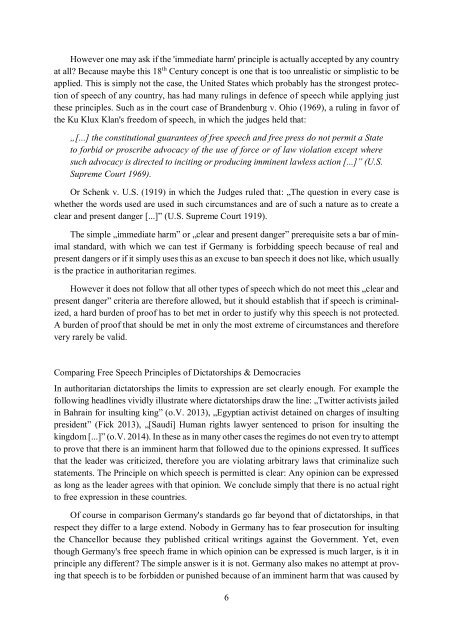SFP 1-1
Sie wollen auch ein ePaper? Erhöhen Sie die Reichweite Ihrer Titel.
YUMPU macht aus Druck-PDFs automatisch weboptimierte ePaper, die Google liebt.
However one may ask if the 'immediate harm' principle is actually accepted by any country<br />
at all? Because maybe this 18 th Century concept is one that is too unrealistic or simplistic to be<br />
applied. This is simply not the case, the United States which probably has the strongest protection<br />
of speech of any country, has had many rulings in defence of speech while applying just<br />
these principles. Such as in the court case of Brandenburg v. Ohio (1969), a ruling in favor of<br />
the Ku Klux Klan's freedom of speech, in which the judges held that:<br />
„[...] the constitutional guarantees of free speech and free press do not permit a State<br />
to forbid or proscribe advocacy of the use of force or of law violation except where<br />
such advocacy is directed to inciting or producing imminent lawless action [...]” (U.S.<br />
Supreme Court 1969).<br />
Or Schenk v. U.S. (1919) in which the Judges ruled that: „The question in every case is<br />
whether the words used are used in such circumstances and are of such a nature as to create a<br />
clear and present danger [...]” (U.S. Supreme Court 1919).<br />
The simple „immediate harm” or „clear and present danger” prerequisite sets a bar of minimal<br />
standard, with which we can test if Germany is forbidding speech because of real and<br />
present dangers or if it simply uses this as an excuse to ban speech it does not like, which usually<br />
is the practice in authoritarian regimes.<br />
However it does not follow that all other types of speech which do not meet this „clear and<br />
present danger” criteria are therefore allowed, but it should establish that if speech is criminalized,<br />
a hard burden of proof has to bet met in order to justify why this speech is not protected.<br />
A burden of proof that should be met in only the most extreme of circumstances and therefore<br />
very rarely be valid.<br />
Comparing Free Speech Principles of Dictatorships & Democracies<br />
In authoritarian dictatorships the limits to expression are set clearly enough. For example the<br />
following headlines vividly illustrate where dictatorships draw the line: „Twitter activists jailed<br />
in Bahrain for insulting king” (o.V. 2013), „Egyptian activist detained on charges of insulting<br />
president” (Fick 2013), „[Saudi] Human rights lawyer sentenced to prison for insulting the<br />
kingdom [...]” (o.V. 2014). In these as in many other cases the regimes do not even try to attempt<br />
to prove that there is an imminent harm that followed due to the opinions expressed. It suffices<br />
that the leader was criticized, therefore you are violating arbitrary laws that criminalize such<br />
statements. The Principle on which speech is permitted is clear: Any opinion can be expressed<br />
as long as the leader agrees with that opinion. We conclude simply that there is no actual right<br />
to free expression in these countries.<br />
Of course in comparison Germany's standards go far beyond that of dictatorships, in that<br />
respect they differ to a large extend. Nobody in Germany has to fear prosecution for insulting<br />
the Chancellor because they published critical writings against the Government. Yet, even<br />
though Germany's free speech frame in which opinion can be expressed is much larger, is it in<br />
principle any different? The simple answer is it is not. Germany also makes no attempt at proving<br />
that speech is to be forbidden or punished because of an imminent harm that was caused by<br />
6



